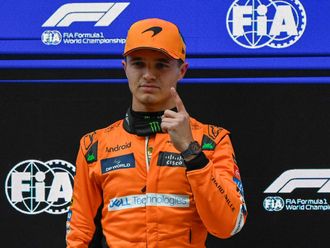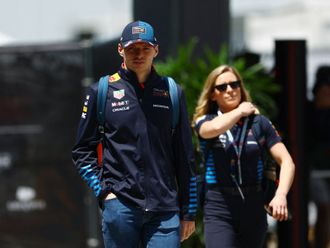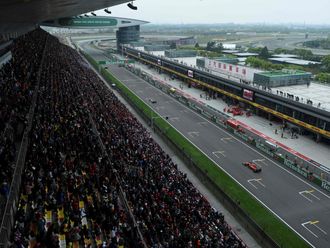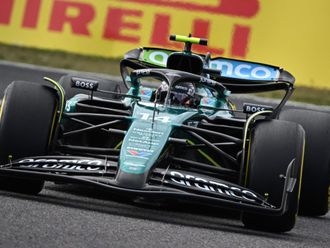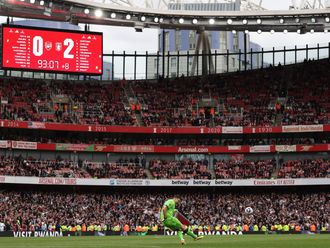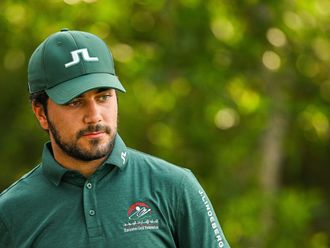London: Formula One’s revolution under the steerage of new guiding hand Chase Carey, after decades of rule by ousted supremo Bernie Ecclestone, is buzzing with anticipation and excitement at the fresh boss’s plateau of promises.
The comparison between outgoing Ecclestone, the ex-trawler fisherman’s son and self-made billionaire from a humble background, and incoming Carey, the privileged product of a starkly contrasting background enjoying a mega-wealthy upbringing enhanced with a USA Colgate University and then Harvard Business School education, where he earned Master’s Degree, is as vividly varied as can be.
Irish-American Carey is the familiar regular on the Grand Prix scene since the Liberty Media last autumn bought F1 from the private equity owners CVC Capital Partners in an $8 billion (Dh29.3 billion) deal. Straightaway new owner John Malone appointed Carey as the head of the toweringly high profile global operation.
The 54-year-old, an adept and widely respected and admired businessman and former president of 21st Century Fox where, in just one of his business triumphs, he nailed a $1.6 billion NFL rights deal that promoted the cable network as the major American sports broadcaster, faced, and still does, a series of challenges to revitalise Formula One and accelerate it to yet another level.
A report on his London office desk, the immaculately shiny new F1 HQ, not too far from Ecclestone’s old base, revealed a series of concerns, like TV audiences that had slumped from 600 million to 400 million since 2008, a worry that demanded instant and urgent action.
The podium takeover, too, by a handful teams — Mercedes, Ferrari and Red Bull — was a concern that an elite and select few were cornering all the attention and boring the fans.
Another upset has been the falling out of the running and virtually enforced quitting of smaller cash-rationed teams such as Manor and HRT with them and other also-rans struggling to get financial backing from a system that favours the already wealthy moneybags hotshots.
Casey, a planner of cold-eyed intent, has made it abundantly clear he and his backers and outfit preside over a distinctly different Formula One series from that set up by Ecclestone and he vows planning and organisation discussed by him and the unit and not off-the-cuff making of decisions as was the previous regime. His long term aim is strategic planning and painstakingly thought-out action.
And, as was his view, aired by a close associate, Casey’s long-term experience at the top level, guided and supported by his firm friend and ally of twenty years, multi-billionaire Rupert Murdoch, has equipped him for the toughest of challenges.
He was brought to the focus of Liberty Media when, while working at Direct TV he added one million new subscribers a year. and opened his trail to being president of Murdoch’s NewsCorp and then chief officer and eventual president of 21st Century Fox.
At his sumptuous office, decorated with F1 memorabilia such as Lewis Hamilton’s framed gloves, GP tyres and countless replica trophies, in the elegant St James area, five minutes from Ecclestone’s Knightsbridge base, he relaxed and mused over a coffee only too keen to boost the image of the sport he enjoys more and more almost by the minute.
He gazes around the souvenirs and says: “Look at them. All special treasures. They are what this office is — and will be — all about. Cherishing and rejoicing in the history of F1 and the drivers and people who have brought it so much honour and pride.
“Excitement, too. It makes you want to energise and develop and innovate our sport to even higher levels. I feel so privileged to be a moving force in that ambition.
“I want to ensure that Bernie has the credit for making F1 such a spectacle because it was a great degree a one-man effort and show. He must be handed the credit for what used to be just a hobby until he made it an asset sold for $8 billion.
“In the last five or 10 years I don’t believe it has done the things it needed to do to maximise its potential and extensive promise. So, in many ways, my job is a start up.”
New Yorker Chase — his real name is Charles Gordon Carey — underwent a crash course in accountancy at Price Waterhouse en route to his high-flying appointments in big-time business. But despite his high profile he resists any personal promotion and shies away, preferring virtual anonymity, from recognition beyond that of the demands of his placement.
“I am a very private person,” protests the married father of two, “and I prefer it that way.” He has homes in Los Angeles, New York and London has amassed a fortune of around $25 million and reaps at least $3 million-a-year as the F1 figurehead. But he won’t even reveal what brand of car he drives.
Martin Sorrell, a one-time FI board member, is an unashamed admirer of Chase’s and he says: ”He has the broadest of visions. It is digital and United States focused. Because of his background he sees Formula One more as a form of entertainment than a sport. And that’s the way to go.”
Chase agrees and he adds: ”Races should become destinations. Three-day festivals. I’d love to see new circuits and GPs in New York, Miami or Las Vegas. There is a special magic about a city race and we have talked about it. We would love to have those connections and build a long-term relationship with the area.
“To give the fans real value for money tracks should be designed to facilitate more overtaking as F1 engines will be faster, louder and cheaper. We have around 500 millions followers around the world — but we don’t have the data base to connect with them. And that’s another factor I my ream will be working hard to improve.”
One of his principle aims is probably the most controversial … well … among the top, huge-spender teams that is. He wants a fairer share for the minor support outfits of the monies allotted by the Formula One system. He will be held back on that ambition because an agreement on the share-out is not scheduled to expire until 2020.
But that doesn’t stop him considering an fresh outcome and he says:” In the USA, where I come from, most sports have a cost cap. What some teams spend on putting a team in to F1 just does not make sense.It is not healthy. And the economics as they are currently exist are not right. They are not healthy for the sport. And they are unfair and do nothing to improve the sport.”
That is one area of his thinking and planning that could agitate areas of serious disagreement and, already, Ferrari’s tough and unrelenting president, Sergio Marchionne, protests that his team would quit the championship race if cash reforms go too far.
But Chase, refusing to kowtow to any threats, insists: ”We don’t race for the teams. We do it for the enthusiasts. And if there were ten teams competing with no spectators nobody would care a jot About F1. Everything we do we do for the fans — and for the good of the sport and its continuation as world spectacle.”
Now what about that eye-catching six-inch moustache? It is not a fashion fad. He grew it to cover a spectacular scar suffered when he, of all things, he played rugby for his college team. But that pastime is an other story.


